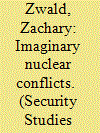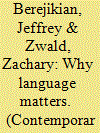| Srl | Item |
| 1 |
ID:
124788


|
|
|
|
|
| Publication |
2013.
|
| Summary/Abstract |
Although the question of how policymakers arrive at their nuclear doctrine and force structure preferences is one of unparalleled importance, it has not received systematic attention in international relations. This article, therefore, develops and illustrates a behavioral model of nuclear deterrence preference formation wherein variation in such preferences is a function of the content and flexibility of one's theory-driven thinking. A policymaker determines the value of potential doctrine and force structure positions in the context of his or her beliefs about the nature of how nuclear conflict will likely begin and proceed-i.e., whether more as a result of rational and deliberate action or due to fear, misperception, and accident. This analysis challenges the dominant explanations of doctrine and force structure preference formation that are implicit in IR. It suggests how the dialogue of the deaf in domestic debates over nuclear weapons policy can be reduced in the future and provides new criteria by which to recast the proliferation optimist-pessimist debate.
|
|
|
|
|
|
|
|
|
|
|
|
|
|
|
|
| 2 |
ID:
187113


|
|
|
|
|
| Summary/Abstract |
The presumed “gap” in fundamental foreign policy beliefs between what Huntington (1957) described as “liberal society” and the “conservative military mind” lies at the core of research on civil–military relations. However, we still know surprisingly little about the precise nature of differences between the two groups’ core foreign policy orientations. This study presents the first empirically grounded evaluation of the public–military gap. We deployed a unique survey to directly compare the views of 470 active-duty US military officers against a representative sample of the American public. Our study included beliefs concerning the appropriate role of military force and of US engagement in global affairs, the likely direction of US national security in the coming decade, and the causes and costs of future military conflicts. While we confirm aspects of Huntington’s dichotomy, we also observe critical differences between the two groups that diverge from the traditional conceptualization of a “civil–military gap.”
|
|
|
|
|
|
|
|
|
|
|
|
|
|
|
|
| 3 |
ID:
174727


|
|
|
|
|
| Summary/Abstract |
Despite the obvious the risks involved in deterrence bargaining, we know surprisingly little about how the public evaluates risk during a crisis. A limited deterrence scholarship considers domestic preferences and tends to assume that the public’s risk tolerance remains stable throughout a deterrence episode. Yet, robust findings in cognitive psychology suggest that people’s risk tolerance can shift dramatically based on how the potential outcomes of military options are framed. We evaluate these competing views through a series of decision experiments grounded in prospect theory. Across an array of potential extended deterrence scenarios, we demonstrate that simply reframing the language used to describe the possible outcome of military options affects both the public’s willingness to accept risks and, therefore, their willingness to escalate the crisis. These findings condition long-standing concerns about the public’s intransigent risk disposition, which underpin research on costly signaling, deterrence traps, and nuclear self-deterrence.
|
|
|
|
|
|
|
|
|
|
|
|
|
|
|
|